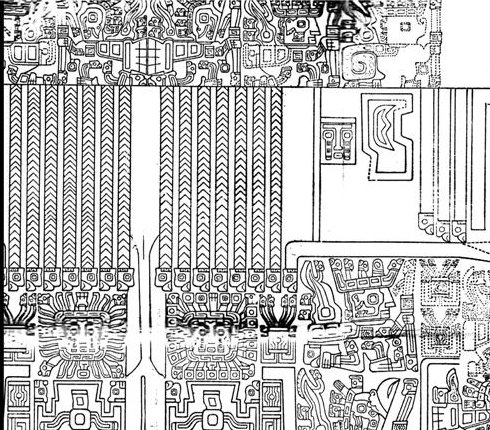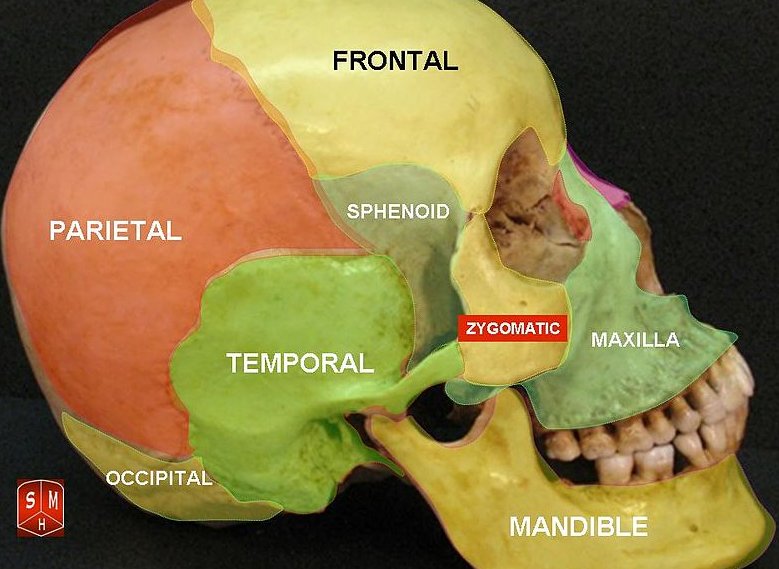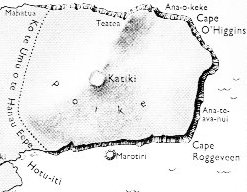|
GLYPHS
Aa5-15-2 Here I recall the number of night signs which were documented (and meant to be counted) in the tresses on the back side of Pachamama:
Counting from right to left implies a location on the night side, where the Sun was bound to move under the earth from the horizon in the west to the horison in the east before rising fresh as new again. Let's count: ... Metoro has given us information about goe (the Milky Way) not only at Aa6-66 but also at Aa5-77 (→ 57 weeks = 399 days, to be compared with 66 * 6 = 396 = 399 - 3):
They used 72 nails in order to confine Osiris securely in his coffin before he was set afloat down the river (Nile ↔ the Milky Way): ... But Osiris's evil brother, Set, whose sister-wife was the goddess Nephtys, was mortally jealous both of his virtue and of his fame, and so, stealthily taking the measure of his good brother's body, he caused a beautifully decorated sarcophagus to be fashioned and on a certain occasion in the palace, when all were drinking and making merry, had it brought into the room and jestingly promised to give it to the one whom it should fit exactly. All tried, but, like the glass slipper of Cinderella, it fitted but one; and when Osiris, the last, laid himself within it, immediately a company of seventy-two conspirators with whom Set had contrived his plot dashed forward, nailed the lid upon the sarcophagus, soldered it with molten lead, and flung it into the Nile, down which it floated to the sea ... Hiko. 1. To ask (for something). 2. To filch, to pilfer. Hikohiko, to snatch by force; robbery by assault. Vanaga. Hikohiko keke, hide-and-seek. Churchill. Pau.: 1. To glean. Mgv.: kohi, to gather, to collect. Ta.: ohi, to glean. Mq.: kohi, id. Ma.: kohi, to gather. 2. Bamboo. Mgv.: kohe, id. Ta.: ohe, id. Mq.: kohe, id. Sa.: 'ofe, id. Ma.: kohe, a plant name. 3. Diarrhea. Ta.: ohi, dysentery. Churchill. Mgv.: kohiko, a small bag mounted in the fruit-picking fork. Mq.: kohiko, a small net. Churchill. Iko. 1. To take away, to carry off, to despoil, to seize food, to possess oneself of, to dispossess, to deprive, to intercept, to subtract, to usurp, to arrogate to oneself. Ikoa, to seize, to take possession. Ikoiko, to seize, to deprive. PS Mgv.: iko, to take off, to deprive, to bereave. Mq.: hiko, to take away, to carry off, to take by force, to rob, to extract. Sa.: i'ofi, tongs. To.: hiko, to take out of the fire. 2. Mq.: iko, to be on good terms. Ha.: lio, to have great affection for. Churchill. ... Teke took command of the Hanau Eepe and went with them to Poike. Teke. Occiput. Teketeke, short (not tall); also: teke. Vanaga. Teke ki nei, as far as, until (? tehe 1). Teketeke, crest, ridge. Churchill.
... After he had settled them there, Teke said to the Hanau Eepe, 'Settle her, work, and keep peace among yourselves (he mee o mahamaha kina); let this be the goal of every one of you!' Then Teke assumed royal powers (pahera ariki) and passed them on to Iko. Teke installed the king; Iko was (now) the king (ariki) of the Hanau Eepe. Teke called out to the men, 'Iko is your king, oh people (mahingo)!' The Hanu Eepe remained there. Teke returned. (He) came to Oromanga (name corrected; alternative translation: Along came the adopted rat, kiore ma(a)nga.). That was Iko. Twenty-five years ... [E:85]
|
|||||||||||||||||||||||||||||||||||||||||||||||||||||||||||||||||||||||||||||||||||||||||||||||||||||||||||||||





